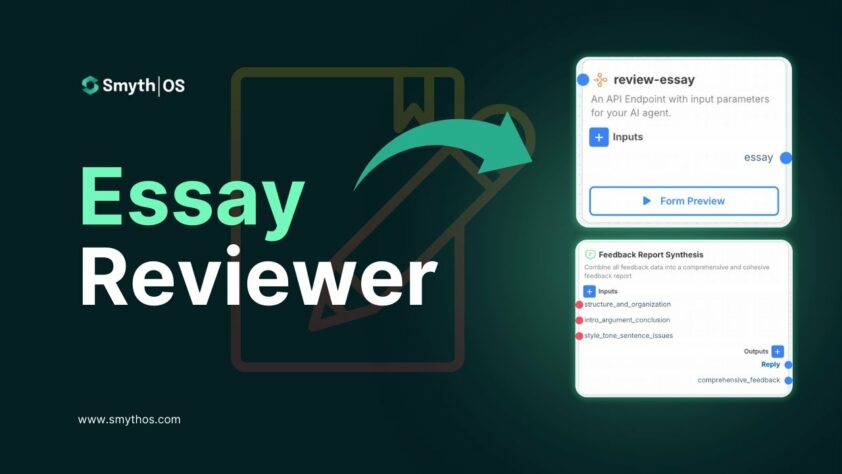AI-powered essay review represents a significant advancement in writing improvement. Using advanced artificial intelligence models, these digital tools analyze written content across multiple dimensions, examining structure, grammar, coherence, and topic relevance with remarkable precision.
Unlike traditional feedback methods that can take days or weeks, AI review systems provide immediate, comprehensive assessments of writing quality. They offer both overall ratings and specific improvement suggestions, highlighting problematic sentences, organizational flaws, and stylistic inconsistencies that might otherwise go unnoticed.
The technology serves diverse users with different needs. Students receive guidance to strengthen academic writing skills, educators gain assistance in providing consistent feedback, and professional writers benefit from an objective assessment of their work’s clarity and impact. The result is a more efficient pathway to writing improvement, with personalized insights that target each writer’s specific challenges.
How Does AI Analyze and Provide Essay Feedback?


AI essay analysis has become increasingly sophisticated, transforming how writers receive feedback on their work. These intelligent systems examine multiple dimensions of writing simultaneously, providing comprehensive assessments that once required hours of human expertise.
The Technical Foundation of AI Essay Analysis
At its core, AI essay analysis relies on natural language processing (NLP) algorithms that break down text into grammatical components—subjects, verbs, objects—to evaluate syntax and structural integrity. These systems can distinguish between simple grammatical errors and more complex issues with sentence variation and complexity.
Advanced AI reviewers employ Latent Semantic Analysis (LSA) to understand relationships between words and concepts. Rather than simply identifying keywords, LSA evaluates how terms connect contextually, allowing the AI to assess whether a student has grasped deeper meaning in their writing.
When analyzing coherence, AI tools map the logical flow between sentences and paragraphs, identifying when transitions are abrupt or ideas don’t connect properly. This creates a comprehensive evaluation of how well thoughts are organized throughout the essay.
| Component | Description |
|---|---|
| Grammar & Mechanics | Evaluates the technical correctness of writing, including grammar, punctuation, and spelling. |
| Structure & Organization | Analyzes how effectively the essay is constructed, including logical flow and coherence. |
| Content & Ideas | Examines the depth and relevance of the essay’s content, including argumentation and evidence. |
| Authenticity Indicators | Looks for signs of genuine personal voice and reflection versus generic writing. |
| Emotional Impact | Assesses the essay’s ability to create an emotional connection with readers. |
Types of Feedback Provided
AI systems deliver multi-layered feedback that addresses both technical and substantive aspects of writing. Grammar and spelling corrections represent just the surface level. More sophisticated systems evaluate stylistic elements like sentence variety, passive voice usage, and word choice appropriateness.
Beyond mechanics, AI essay reviewers assess thematic coherence—how well the essay maintains focus on central ideas and develops them logically. They can identify when supporting evidence is weak or when arguments lack proper development, suggesting ways to strengthen the essay’s persuasive power.
For academic writing specifically, AI tools evaluate how effectively essays respond to prompts, checking for relevant content and appropriate citation of sources. Some systems compare the essay against databases of human-graded samples to benchmark quality and provide appropriate scoring.
Personalized Learning Through AI Feedback
What makes modern AI essay analysis particularly valuable is its ability to generate customized feedback. By tracking patterns in a student’s writing over time, these systems can identify persistent challenges and strengths, providing targeted guidance for improvement.
For instance, if a student consistently struggles with thesis development, the AI might suggest specific techniques for clarifying main arguments. Or if sentence structure lacks variety, the system can offer examples of alternative constructions that would enhance readability.
This personalization extends to adapting feedback based on writing purpose. College application essays receive different criteria emphasis than analytical research papers, with admissions-focused tools evaluating personal narrative strength and authenticity alongside technical proficiency.
The Evolution of AI Analysis Methods
Earlier AI writing tools relied heavily on pattern matching and rule-based evaluations. Today’s systems leverage machine learning trained on millions of human-graded essays, allowing them to recognize subtle qualities of effective writing that transcend mechanical correctness.
Modern AI reviewers can evaluate rhetorical devices, argument quality, and even creativity in certain contexts. They analyze how well evidence supports claims and whether counterarguments are addressed—assessments that require understanding beyond surface text.
As these technologies advance, they’re increasingly able to provide feedback on higher-order concerns like originality of thought and depth of analysis, moving beyond technical correctness to evaluate intellectual contribution.
What Are the Benefits of Using AI for Essay Review?


AI essay review tools have transformed how writers receive and implement feedback. Unlike traditional methods that might take days or weeks, these digital assistants analyze writing instantly, providing immediate insights when they’re most valuable—during the active writing process.
The democratization of quality writing assistance is perhaps the most significant advancement. Students without access to writing centers or private tutors can now receive comprehensive feedback regardless of geographic or economic limitations.
Instant Feedback and Efficiency
The immediacy of AI feedback fundamentally transforms the writing process. Rather than waiting for instructor comments that might arrive after submission deadlines, writers can receive analysis within seconds of completing a draft.
This rapid-response system enables multiple revision cycles in a single sitting. Research shows that students who receive immediate feedback are 31% more likely to implement suggested changes and show measurable improvement in subsequent drafts.
The psychological benefits of instant feedback shouldn’t be overlooked. Writers can address issues while still mentally engaged with their work, rather than having to reconnect with their thought process days later.
Accessibility and Language Support
For non-native English speakers, AI review tools function as both tutor and confidence-builder. These tools identify grammatical patterns particularly challenging for language learners while offering contextual explanations rather than simple corrections.
The 24/7 availability removes traditional barriers to writing support. Students can work according to their own schedules rather than being limited to writing center hours or instructor availability, creating more equitable access to educational resources.
Many AI tools also include specialized functions for different English dialects and academic conventions, supporting international students navigating unfamiliar writing expectations.
| User Type | Benefits |
|---|---|
| Students | Guidance to strengthen academic writing skills, personalized feedback, 24/7 availability |
| Educators | Assistance in providing consistent feedback, focus on higher-level tasks |
| Professional Writers | Objective assessment of work’s clarity and impact, instant feedback |
Deeper Revision and Critical Thinking
Contrary to concerns that AI might discourage thoughtful writing, evidence suggests these tools promote deeper revision practices. By handling mechanical issues efficiently, writers can devote more cognitive energy to higher-order concerns like argument development and evidence analysis.
The best AI review systems don’t simply identify problems—they explain writing principles, helping users develop transferable skills. This educational approach transforms each essay into a learning opportunity rather than just a task to complete.
AI tools also excel at identifying structural patterns across longer works, spotting inconsistencies or repetitions that might elude human readers focusing on sentence-level concerns. This “big picture” analysis encourages writers to consider document-wide coherence.
Reduced Writing Anxiety
Many students experience significant anxiety around writing, particularly for high-stakes assignments. AI review tools provide a judgment-free environment for experimentation and learning, reducing the emotional barriers to starting difficult writing tasks.
The privacy of AI feedback allows writers to address weaknesses without fear of embarrassment. This psychological safety encourages more ambitious writing attempts and greater willingness to tackle challenging topics or formats.
Research indicates that students using AI writing assistants report lower stress levels and higher confidence in their writing abilities, suggesting these tools offer benefits beyond mere technical improvement.
What Are the Ethical Considerations of AI Essay Review?


As AI essay review tools gain popularity among students and professionals, they bring forth complex ethical questions that challenge our traditional understanding of writing and originality. These tools analyze existing content and provide feedback on everything from grammar to structure, yet their growing sophistication raises concerns about where helpful assistance ends and problematic automation begins.
The Authenticity Dilemma
When writers implement AI suggestions without critical evaluation, they risk diluting their authentic voice. Even subtle word choice recommendations, accumulated over multiple revisions, can gradually transform an essay from distinctly personal to technically polished but generically voiced.
Dr. Melissa Clinedinst, former Director of Research at the National Association for College Admission Counseling, notes: “The ethics of AI review largely depend on whether the student remains the primary author and decision-maker. When AI serves as a tool rather than a ghostwriter, it’s more aligned with traditional forms of feedback.”
This distinction between assistance and replacement forms the crux of the authenticity question. Writers must maintain conscious authority over their work, evaluating each suggestion rather than accepting AI recommendations wholesale.
Equity and Access Concerns
While AI tools can democratize access to quality feedback, they simultaneously introduce new forms of inequality. Premium AI review capabilities often require paid subscriptions, potentially creating advantages for those with financial resources.
This digital divide extends beyond simple access. Students from different cultural and linguistic backgrounds may find that AI tools, predominantly trained on Western academic writing styles, fail to recognize or respect diverse expressions of thought. This algorithmic bias can disadvantage writers whose authentic voice doesn’t conform to these standardized expectations.
The question becomes whether AI review tools truly level the playing field or simply shift existing inequalities to new technological grounds.
The Optimization Problem
Perhaps most concerning is the risk of writers optimizing their essays for AI approval rather than human connection. As users become dependent on AI feedback, they might prioritize technical perfection over authentic communication, producing work that satisfies algorithms but lacks genuine personality or insight.
This over-reliance can stunt the development of critical writing skills and self-confidence. When writers continuously defer to AI judgment, they may never develop their own editorial eye or trust their unique perspective.
Angel Pérez, CEO of the National Association for College Admission Counseling, cautions: “While AI review tools can provide helpful feedback, particularly on technical aspects of writing, students must remember that admissions officers are ultimately looking for authentic voices and genuine reflection.”
| Practice Type | Description |
|---|---|
| Generally Accepted Practices | Using AI for grammar and spelling correction, clarity feedback, and sentence structure suggestions. |
| Context-Dependent Practices | Evaluating emotional impact, structural improvements, and assessing uniqueness. |
| Generally Problematic Practices | Allowing AI to rewrite significant portions, generate new content, or misrepresent writing abilities. |
Redefining Originality in an AI-Assisted World
As AI assistance becomes commonplace, our definition of originality necessarily evolves. Traditional notions focused primarily on whether text was copied from external sources. Now, we must consider more nuanced questions: Does a heavily AI-revised essay still represent the writer’s original thoughts? At what point does extensive AI assistance compromise authenticity?
Academic integrity policies will need updating to address these complexities. Rather than binary distinctions between original and unoriginal work, institutions might develop more sophisticated frameworks that recognize degrees of assistance while maintaining core standards for intellectual honesty.
Some forward-thinking institutions have already begun implementing transparency requirements, asking students to disclose significant assistance, including AI tools, similar to acknowledging traditional editing help.
Ethical Implementation Frameworks
Platforms developing AI review capabilities, like SmythOS, are addressing these ethical considerations through features such as constrained alignment and human-in-the-loop oversight. These guardrails help ensure AI remains supportive rather than supplanting human creativity.
For individual writers, an ethical framework might include maintaining decision authority over all changes, limiting AI use primarily to technical aspects, ensuring human review alongside AI feedback, practicing transparency about assistance received, and consistently evaluating whether their voice remains authentic throughout revisions.
As Dr. Aviva Legatt, former Associate Director of Admissions at the Wharton School, aptly puts it: “AI tools can help polish the presentation, but the substance—your experiences, perspectives, and voice—must be authentically yours.”
How Can Writers Use AI Essay Review Responsibly?


The emergence of AI essay review tools offers a powerful resource for writers aiming to enhance their work. However, using these tools responsibly requires a deliberate approach that maintains the writer’s authority and authenticity. The key is to view AI as a collaborative assistant rather than surrendering control of your unique voice.
Maintain Control Over the Editing Process
When using AI essay review tools, writers must remain the primary decision-makers. Each suggestion should be evaluated individually rather than accepted wholesale. Consider whether a suggested change preserves your original meaning and voice before implementing it.
Dr. Melissa Clinedinst, former Director of Research at the National Association for College Admission Counseling, emphasizes that “the ethics of AI review largely depend on whether the student remains the primary author and decision-maker. When AI serves as a tool rather than a ghostwriter, it’s more aligned with traditional forms of feedback.”
A practical approach is to read your essay aloud after implementing AI feedback. If it no longer sounds like your authentic voice, reconsider the changes you’ve accepted.
Limit AI Use to Appropriate Aspects
AI tools are best used for technical aspects of writing rather than content generation. Consider this spectrum of appropriate use:
- Generally Acceptable: Grammar correction, spelling checks, readability improvements, and sentence structure suggestions
- Use with Caution: Suggestions for structural improvements, transitional phrases, or clearer expression of existing ideas
- Avoid: Allowing AI to generate new content, rewrite significant portions, or fundamentally alter your perspective
Writers should be particularly cautious when AI suggests changes to personal anecdotes, unique perspectives, or the emotional tone of their work. These elements often constitute the most valuable and authentic aspects of your writing.
Incorporate Human Feedback
AI review should complement rather than replace human feedback. Peers, teachers, writing center tutors, and other human readers provide invaluable perspectives that AI cannot replicate.
“Balance AI review with human feedback. Different perspectives will help you identify which suggestions improve your essay while maintaining authenticity,” notes one expert in AI ethics for education.
Writers can strengthen their process by seeking human feedback before and after using AI tools, creating a multi-layered approach to revision that captures both technical improvements and nuanced human insights.
Preserve Your Authentic Voice
Perhaps the most crucial aspect of responsible AI use is maintaining your distinctive voice and perspective. Your authentic expression is what makes your writing uniquely yours.
Before using any AI tool, complete at least one full draft independently to ensure your initial ideas and voice are fully established. This creates a foundation of authenticity that AI assistance can enhance rather than replace.
When reviewing AI suggestions, continually ask: Does this change preserve my meaning and voice? Would I make this change if a human editor had suggested it?
Track Changes and Remain Transparent
Responsible use of AI includes maintaining awareness of how your work evolves. Keep before-and-after versions of your essay to track the nature and extent of changes made through the AI review process.
When appropriate, be transparent about your use of AI tools, particularly in educational or professional settings where disclosure may be expected. This transparency builds trust and acknowledges the collaborative nature of your writing process.
Some schools and universities now have specific policies regarding AI use. Familiarize yourself with relevant guidelines in your context to ensure ethical compliance.
Develop Critical Evaluation Skills
Responsible AI use requires developing the ability to critically evaluate suggestions. Not all AI recommendations will improve your writing, and some may undermine your intended meaning or style.
Consider establishing personal criteria for accepting or rejecting AI suggestions. For example, you might accept grammar corrections but critically evaluate any changes to your word choice or sentence structure.
Over time, this critical engagement with AI feedback can actually strengthen your writing skills as you learn to recognize patterns in your writing that may benefit from improvement.
Use AI as a Learning Tool
Perhaps the most responsible approach to AI essay review is viewing it as an educational resource rather than just an editing service. When AI identifies patterns in your writing, take time to understand the underlying principles or rules.
Instead of simply accepting a correction to a run-on sentence, for instance, learn what makes it a run-on and how to avoid similar issues in future writing. This transforms AI feedback from a quick fix into a valuable learning opportunity.
By approaching AI essay review tools with this mindset of deliberate, critical engagement, writers can harness their benefits while continuing to develop their authentic voice and writing skills. The goal isn’t to produce perfectly polished content through automation, but rather to use these tools as one component of a thoughtful, writer-centered revision process.
Conclusion: Balancing AI Assistance and Human Creativity in Essay Writing


AI-powered essay review tools offer significant benefits for writers aiming to refine their work, providing everything from grammar correction to structural suggestions. When used thoughtfully, these tools can enhance your writing process without compromising your authentic voice.
The most successful approach treats AI as a collaborator rather than a replacement—leveraging its analytical strengths while preserving the uniquely human elements of creativity, emotional resonance, and critical thinking that make writing compelling.
As we explore this evolving landscape, the ethical considerations of AI use in writing deserve our attention. Maintaining academic integrity, properly acknowledging AI assistance, and developing a balanced workflow where technology amplifies rather than diminishes human creativity will be crucial.
By thoughtfully integrating AI tools into our writing practice, we can create more polished, engaging essays while ensuring our unique perspectives and voices remain at the heart of our work.
